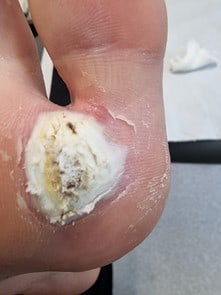What is a Plantar Wart?
Warts or Verrucas – commonly referred to on the feet as plantar warts or verruca pedis, are caused by a common virus that can be very painful on the sole of the foot. The virus is a benign type of Human Papilloma Virus (HPV). The HPV virus has 100’s of different strains and each varying in severity. The HPV virus is responsible for cold sores around the mouth, and in a different (more aggressive strain) is responsible for cervical cancer. HPV is commonly picked up in moist, warm environments, such as swimming pools and wet areas such as bathrooms. It is transmitted by direct contact, however if you have a small crack, scratch or sore it is easier again. People with a weakened immune system can be more vulnerable to developing warts.
Did you know that in children 90% of warts usually resolve themselves within two years and 50% disappear within 6 months. Regrettably warts are more stubborn in adults. Evidence shows that most people will have a wart in some form, at some point in their life.
Warts can be tricky to treat, as we need your immune system to help rid your body of this virus. These clever warts avoid your immune system by wrapping and disguising itself in skin tissue. It is essentially a “shields Up” response once it has found itself to you..
What Do Plantar Warts Look Like?
Generally they appear as an elevated spherical bump with a cauliflower look, however when they are on sole of your foot they don’t grow out, they grow inwards due to the pressure of standing and walking. Most people report that “they appear from out of the blue”.
Warts on the sole of your foot can have an iceberg effect, so what you see may not be the true size of the wart, as pictured below.

How do you treat Plantar Warts?
First of all, if you are pregnant, are living with diabetes, cancer or reduced immunity, have numbness in the area or poor circulation, please seek advice from your podiatrist or Doctor.
There are many options available in your chemist for wart treatments however when not used correctly they can lead to problems like this:

At Umina Podiatry we will develop a treatment plan individualised for your circumstances. So please let us know what treatments you have tried so far.
There is no “gold standard” to treating or eradicating warts, so your podiatrist may interchange treatment options during your treatment.
Treatment options we will consider:
- Topical Treatments – such as paints, pastes or patches.
- Cryotherapy (Freezing)
- Needling
- Surgery
- Laser or microwave treatment.
- And in some cases, no treatment is the best treatment.
Most treatments for warts will take several weeks. We talk more about treatment here.
Warty FAQs
Are Warts contagious?
Yes, they are contagious and spread by direct contact. Do not share towels, and avoid going barefoot in common areas. Cleaning the bottom of the shower after use is advised.
Also be aware that children can and do pick and scratch at the warts, so they may spread them to other parts of the foot or fingers. Consider covering warts with a dressing to avoid spreading.
If you have wart, ensure you change your shoes and socks daily.
Can warts be prevented?
You can certainly minimize the chances of getting the virus by wearing thongs into public wet areas and around the swimming pool.
Isn’t there a vaccine for HPV?
Yes there is a vaccine for HPV but this primarily targets anogenital warts to prevent cervical cancer. There have been anecdotal reports that have seen the clearance of other warts once this vaccine has been given, especially in girls, as they receive two doses of this vaccine.
Can I treat my warts at home?
Your podiatrist will work with you, and in some cases you can and will be able to do some of the treatment at home yourself. We still recommend regular check in’s with your podiatrist.
